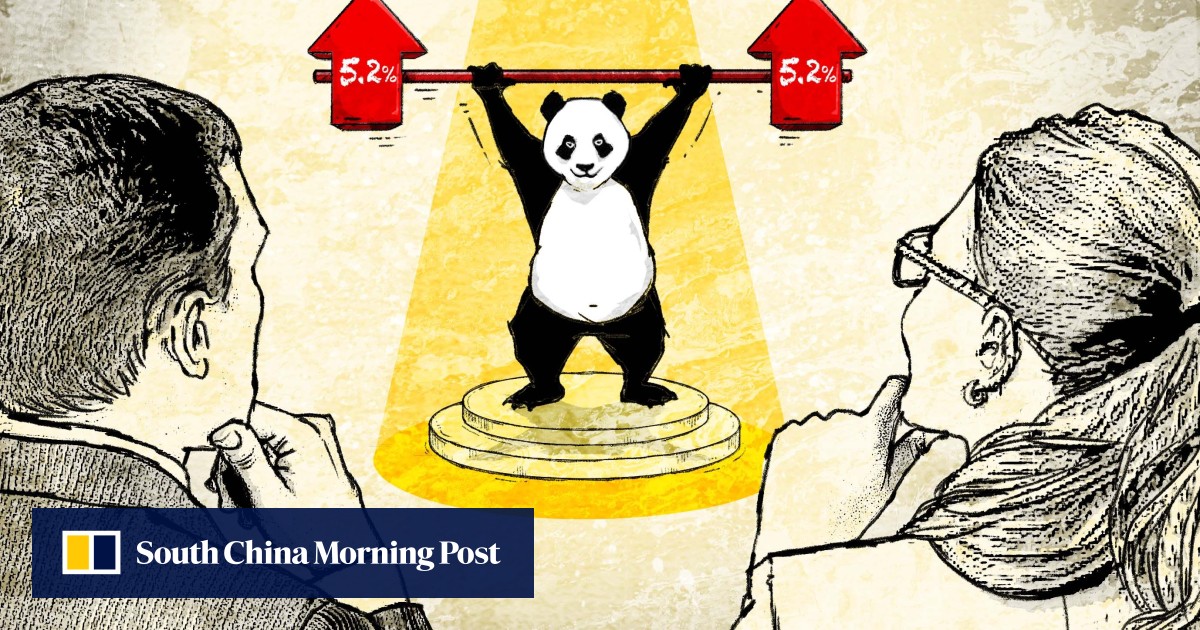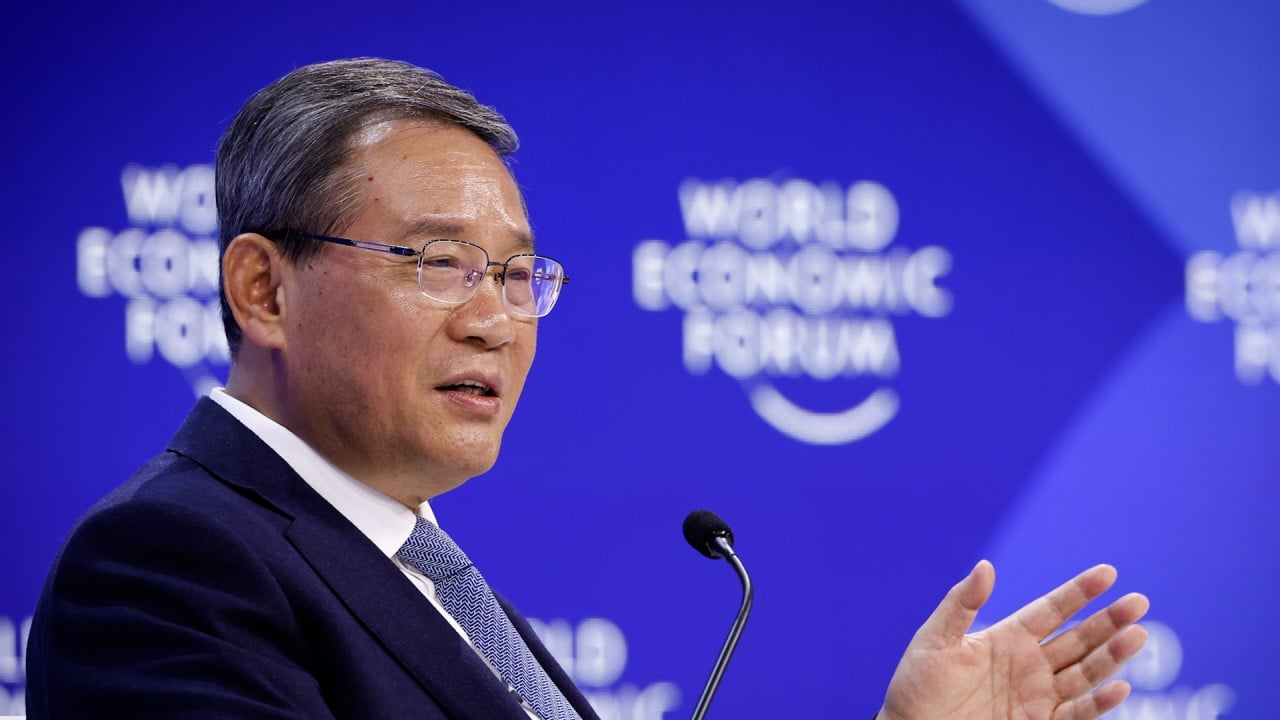However, the declaration has largely failed to prevent a dwindling of confidence – be it among the foreign business community, private entrepreneurs or domestic consumers.
Across China, a large cross-section of foreign businesses is struggling to cope amid what has been a gulf between their tepid business performances and Beijing’s rose-tinted account of the economy.
‘Recovery is still shaky’ as China looks to get economy on solid footing in 2024
‘Recovery is still shaky’ as China looks to get economy on solid footing in 2024
Instead, challenges pertaining to national security, data flows and continued market barriers dominate hearts and minds, fuelling doubts about increasing investments in China, as well as contemplations about exploring overseas opportunities.
“The economic slowdown continues to be a major concern for our member companies,” Eric Zheng, the president of the American Chamber of Commerce in Shanghai, said on Tuesday after the 5.2 per cent growth announcement.
He also highlighted the existence of “scepticism” surrounding the accuracy of China’s official statistics, but acknowledged that “China could still be on its way to recovery from the Covid trough amid serious headwinds such as the struggling real estate sector and faltering confidence”.
“An expansive policy toolbox for economic recovery is crucial to improving the confidence of American companies in China,” Zheng said.
Meanwhile, many foreign investors say they have felt hard-pressed to make money or expand business in China, particularly as opportunities have long favoured their state-owned rivals.
For instance, foreign-, Hong Kong-, Macau- and Taiwan-invested companies reported a dismal 1.4 per cent annual industrial output growth last year, in contrast with the 5 per cent expansion of state-owned enterprises, according to National Bureau of Statistics data.
Although the 1.4 per cent figure may partly reflect a shrinking industrial presence of foreign players, with capacity relocations to cheaper locales or home countries, it also quantifies the declining level of confidence and growing unease.
The discussion over China’s economic prospects heated up last summer and fuelled discourse over whether the country remained investible, particularly as the trade tensions with the United States intensified.
Many foreign manufacturers have relocated or considered a Plan B amid punitive tariffs that Washington has slapped on Chinese goods since 2018, plus more recent tech curbs.
‘Growth nothing to write home about’: 7 takeaways from China’s economic data
‘Growth nothing to write home about’: 7 takeaways from China’s economic data
In the third quarter of last year, China also booked its first deficit since 1998 in direct investment liabilities – a broad measure of foreign direct investment (FDI) that includes foreign companies’ retained earnings in the country. The State Administration of Foreign Exchange said the deficit reached US$11.8 billion during the July-September period.
“We care much less about the actual GDP number – whether it’s 4.2, 5.2 or 6.2 [per cent] – than we care about the composition,” a China-based European investor said on condition of anonymity because of the matter’s sensitivity. “What we would really like to see is growth in the consumption part of GDP. And that’s, unfortunately, not well.”
There also appears to be a rising belief among foreign companies, especially those with a big China presence, that they need to hedge against China’s slowdown and geopolitical risks.
“[They are] considering whether they would be better off placing some of their investments – diversifying a little bit – out of China. I think we’re seeing a real squeeze,” the source said.
2024 may become tough since demand … is not holding up well
Meanwhile, many foreign firms are conducting their own assessments of the Chinese economy, and these are based on not only publicly available data from the government, but also high-frequency industry figures and chatter.
Yang Yeqing, a marketing and sales director at the Shanghai office of a Japanese robotics company, said they were paying more attention to fixed-asset investment numbers and trade data.
The producer of industrial robots for carmakers and building materials also had no plans to expand in China this year, citing chills in some business segments.
“We feel 2024 may become tough since demand, including exports, is not holding up well, as we can see from these data and statistics,” he said.
China’s property investment slumped 9.6 per cent in 2023, while total exports dropped 4.6 per cent. But car sales were a bright spot, increasing 5.6 per cent last year, official data showed.
Tomoo Marukawa, a professor specialising in the Chinese economy at the University of Tokyo, said China’s 5.2 per cent annualised growth was within the realm of possibility.
Marukawa said this reflected the real situation – that of a bumpy, uneven recovery in numerous sectors.
Owing largely to the pandemic and corresponding policies over the last few years, China’s economy experienced dramatic swings in its annualised growth that had started with negative growth in the first quarter of 2020 that helped dragged the yearly growth to 2.2 per cent, followed by 8.4 per cent in 2021, 3 per cent in 2022 and 5.2 per cent in 2023.
US retail giant Costco reportedly considered various factors – from per capita disposable income to luxury car sales – in choosing where to create footholds in China last year.
In Zhejiang province, Costco’s China team was said to have appraised a host of data brandished by provincial officials responsible for driving foreign investments, according to Zhejiang media. And the American company reportedly commissioned independent surveys of local consumption sentiments before settling on Ningbo and Hangzhou – the two biggest cities in the eastern economic powerhouse – to open Costco’s fourth and fifth big-box retail stores in the country.
China’s nationwide per capita income stood at 39,218 yuan (US$5,525) in 2023, while Ningbo and Hangzhou’s corresponding figures were above 80,000 yuan (US$11,270).
China’s ‘days of runaway growth have gone’, firms urged to thrive overseas
China’s ‘days of runaway growth have gone’, firms urged to thrive overseas
Now Costco operates six stores across Shanghai, Suzhou, Ningbo, Hangzhou and Shenzhen – all relatively affluent cities – while two more, Nanjing and Guangzhou, were on its expansion radar for this year, according to Richard Zhang, president of Costco Asia.
“China remains a key focus, and we will use the performance of the first few stores in Shanghai and other select cities as a gauge to assess whether to push deeper into the China market,” Zhang was quoted as saying by Shanghai media last year.
Alex Ma, an assistant professor with Peking University’s School of Governance, touched on how foreign investors’ interpretation of China’s economic outlook is affected by geopolitics and macroeconomic factors.
“China still needs to do more,” he told the Post. “It needs to go beyond reporting nice economic data. Attracting and retaining foreign investments matter a lot [in terms of] the transfer and acquisition of foreign technologies and management skills.”
With challenges facing foreign firms persisting, and ties with the West waning, China’s receipt of foreign investments last year fell by an annualised 8 per cent, to 1.13 trillion yuan. But the Ministry of Commerce has not yet released the US dollar figure, which is believed to have seen a bigger drop because of the yuan’s depreciation.
Foreign investment is equivalent to only 0.9 per cent of the national GDP, significantly lower than the 2 per cent average in the past decade.
Despite this, Ma said foreign firms and investments have had an outsized positive impact on China’s industrial and consumption upgrades.
During his speech in Davos, Premier Li said that, in the past five years, the return on foreign direct investment in China stood at around 9 per cent, calling it “quite competitive, globally”.
Li also vowed to “work tirelessly” to foster a market-oriented, law-based and world-class business environment, to expand institutional opening up, to remove access restrictions and to shorten the so-called negative list, which states the areas where the government forbids or restricts foreign investment.
“We will also hear the views of foreign businesses regularly and take active steps to address reasonable concerns,” Li vowed.
How such promises pan out is sure to be closely watched and scrutinised by those with a vested interest in China’s economic recovery.


